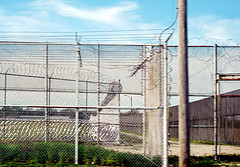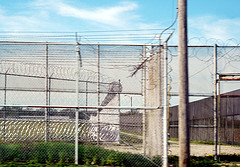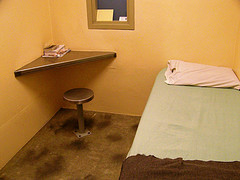Is a life sentence for a 13-year-old cruel & unusual punishment?

Joe Sullivan was 13 when he raped a 72-year-old woman in 1989. He was sentenced in Florida to life without the possibility of parole.
Terrance Graham was 17-years-old and on probation for a number of crimes in Florida. After committing a home-invasion robbery, he was also sentenced to life without release. The U.S. Supreme Court will hear arguments in the Sullivan and Graham cases in November, 2009.
 In addition to arguing the individual facts of each case, their lawyers are relying on international law. The United Nations Convention on the Rights of the Child prohibits sentences of life without parole for juveniles. The United States is reportedly the only country in the world that has this penalty for juveniles in non-murder cases. There are 109 people serving life without parole for juvenile offenses that did not involve a homicide. According to the Equal Justice Initiative, only eight people in the world are serving life without parole sentences for crimes committed when they were 13 – all are in the U.S.
In addition to arguing the individual facts of each case, their lawyers are relying on international law. The United Nations Convention on the Rights of the Child prohibits sentences of life without parole for juveniles. The United States is reportedly the only country in the world that has this penalty for juveniles in non-murder cases. There are 109 people serving life without parole for juvenile offenses that did not involve a homicide. According to the Equal Justice Initiative, only eight people in the world are serving life without parole sentences for crimes committed when they were 13 – all are in the U.S.

Since the Supreme Court decision in Roper v. Simmons in 2005, juveniles are no longer eligible for the death penalty regardless of the number or nature of their crimes.
Do you think that natural life without the possibility of release constitutes cruel and unusual punishment in non-homicide cases? What do you think “cruel and unusual” means? Can you think of any situation where such a penalty would be appropriate?
In the Simmons case, the Supreme Court stated that teenagers were immature, unformed, irresponsible, and susceptable to negative influences, including peer pressure. Consequently, the death penalty was ruled inappropriate for minors. Should the same reasoning apply to teens who commit crimes other than murder?
Some in favor of changing the law point to past offenders who have rehabilitated themselves: actor Charles Dutton who was convicted of manslaughter at 17; former senator Alan Simpson adjudicated as a juvenile for destroying government property; U.S. Attorney Terry Ray who was a violent repeat offender; and Detroit city council hopeful Raphael B. Johnson.
Update: On May 17, 2010 the Court ruled that life without the possibility of parole for juveniles in non-homicide cases is unconstitutional.* The Court stated that “the limited culpability of such offenders, and the severity of these sentences all lead the Court to conclude that the sentencing practice at issue is cruel and unusual.” They went on to say that “A life without parole sentence improperly denies the juvenile offender a chance to demonstrate growth and maturity.”
Life for Child Pornography: In a somewhat related case, some judges consider child pornography as serious as murder. Guevara Vilca was 26-years-old when he was caught with 454 photos of children on his home computer. The Florida resident had no previous criminal record. He was offered a plea bargain of twenty years in prison which he turned down claiming he didn’t know the images were on his computer. In November, 2011, Vilca was sentenced to life in prison without the possibility of parole. This raises the question of appropriate sentencing – penalties that fit the crime and the offender. Had Vilca actually touched a minor, his sentence would arguably been significantly less. What do you think? Should people who possess pornographic images of children or young teenagers be sent to prison for life?
*Graham v. Florida, U.S. Supreme Court, May 17, 2010.



Thank you for the post, I looked up some docket info. If you want to read my post on it… I would appreciate any thoughts you may have.
http://politicalcartel.org/2009/11/02/inchoate-justice-should-we-reconsider-sarah-kruzan
thanks 🙂
does az permit life sentences for juveniles?
Judge Tom’s Response:
Yes, under Arizona law, any minor over 8-years of age and tried as an adult can be sentenced to life in prison.
are juveniles subject to life terms? does it differ by state?
Judge Tom’s Response:
Yes, it’s a state-by-state decision whether a juvenile can receive a life sentence. If a teen is tried as an adult, he or she is eligible for adult sentences except for the death penalty. If the teen stays in the juvenile system, then he or she may be locked up until 18 to 21 years-of-age.
The U.S. Supreme Court will hear two cases this Fall (2009) about juveniles getting life without the possibility of parole or release. Some 13-year-olds are serving this sentence!